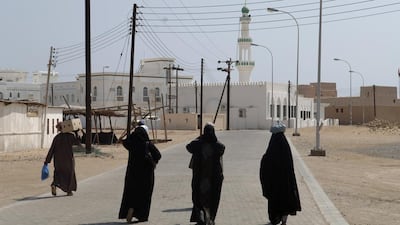It all started when six Omani working women met in a coffee shop in Muscat's popular Al Mouj waterfront community to discuss paid maternity leave. Frustrated by the length of time new mothers are able to take off work under Omani law — 50 days in the private sector and 60 days in the public sector — they decided to do something about it.
Today, five weeks after that meeting, a campaign launched by the six women calling for paid maternity leave to be extended to four months is in full swing. More than 380 women have so far pledged their support by signing their names in a book kept at the Muscat offices of the Omani Women Association. And by the end of the month, the women who launched the campaign hope to submit a petition to Oman's elected Shura Council, calling for the law on maternity leave to be changed.
“Once the number of women looking to change the maternity leave law reaches 500, we will write a petition to the Majlis Al Shura (Shura Council)," said one of the six, 28-year-old Suhaila Al Ghafri who is the mother of a three-month-old baby and an administrator for the Public Authority for Industrial Zones.
"We are confident that, before the end of this month, we will reach our target of 500 women. We will send over the demand signed by all of us.”
____________
Read more:
Omani women to take the wheel of taxis and heavy good vehicles
Husbands are a handicap, say career-minded Omani women
More Omani women than men are initiating divorce
____________
Under Omani law, any changes to legislation must first be approved by the Shura Council before being passed to the non-elected Cabinet of Ministers for final approval. When approached by The National, the Shura Council said it would not comment on the maternity leave campaign.
Another of the six women behind the maternity leave campaign, 27-year-old civil servant Khadija Al Mukhaillati, said working mothers face a hurdle as they try to balance the demands of both motherhood and work.
"The first few months after the delivery are the most demanding ones. Some of us take unpaid leave so we can spend more time with our babies after the 50 or 60 days of maternity leave. It is never enough," she told The National. Ms Al Mukhaillati is currently on a 60-day maternity leave from work after giving birth for the first time.
In some cases, working mothers with new babies take unpaid leave beyond the 50 or 60 days that they cannot afford. Others even end up leaving their jobs altogether.
“I took a further two months' leave without pay in September last year because the maternity is not enough," said Lamis Al Ghufaili, 31, a computer programmer at the Ministry of Defence and another member of the group who launched the maternity leave campaign.
"My husband and I need two incomes and that caused some financial hardship to us but we had to do it. The [only other] option would have [been] to leave my baby to my mother who is too old to look after very young children.”
Accountant Fatma Al Balushi, 29, was less lucky, however. After the property management firm where she worked refused her request for unpaid leave on top of her paid maternity leave, she decided to resign.
"I quit my work because for me to leave my six-week-old baby with a housemaid is not an option at all," she told The National.
"I would not concentrate on my work if another woman is looking after my baby for eight hours a day while I am in my office. My husband and I cannot really afford it but at least it gives us a peace of mind," she said.
"I will look for another job a few months from now."
The campaign has not only attracted female backers, however. Thabit Al Hinai, a statistician in the Ministry of Housing, said he "fully supported" the extension of paid maternity leave.
“How, as a husband, will I feel comfortable leaving a young baby in the hands of a housemaid after only 50 days?," he asked.
"Maternity leave is not only a woman’s right but the [right of a] husband as well. Marriage is a partnership and the baby joins a man and his wife together."
But some women are sceptical that the Shura Council will approve an extension to paid maternity leave.
“The current Shura Council has only one woman serving on it. There are a total of 84 members in this council. Imagine one woman speaking in the male-dominated legislative assembly. Would these men really understand it?," said 33-year old petroleum engineer Dana Al Freij who is currently six months pregnant with her second child.
"I don’t know but it will be interesting to wait and find out.”

